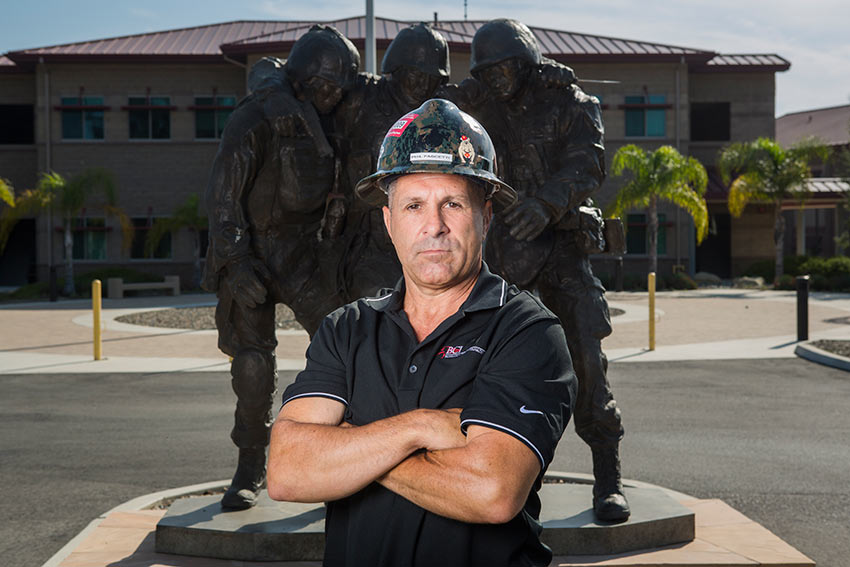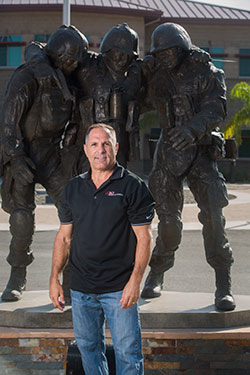By Marg Stark

In 2011, near the end of his 30-year-career in the United States Marine Corps, Division Forward Sargeant Major Phil Fascetti was in charge of the health and welfare of 12,000 marines and sailors living and working in Helmut Province, Afghanistan—one of the most dangerous places on earth.
“We would go to their camps and give them a heads up on what to expect when they went on patrols,” Fascetti said. “We are talking about things like IEDs, locations of insurgent forces, and how to cope with working in 120-degree heat.”
So it’s safe to say Fascetti knows a thing or two about on-the-job hazards. His top priority was always to do everything in his power to get the soldiers under his command home safely.
Fast forward to 2013. Fascetti had retired and, like so many who spend the bulk of their lives in the military, he was somewhat adrift as he tried to figure out what to do next. He had been looking for work for a number of months when, during a round of golf one Friday afternoon, a friend told him about a company that might be looking for someone with his skill set.
It was Barragan Corp International, a risk management firm based in Temecula, CA, that specializes in helping companies comply with worker safety regulations mandated by the federal Occupational Health and Safety Administration (OSHA).
As soon as he was off the course, Fascetti called his friend’s contact at Barragan. He was told his experience as a soldier made him a perfect fit for a second career in safety and risk management.
 By the end of the evening, he had a job. But there was a hitch. While he had enough experience in hazardous situations for multiple lifetimes, he was not up to speed on the many OSHA regulations that a risk management consultant must know and understand.
By the end of the evening, he had a job. But there was a hitch. While he had enough experience in hazardous situations for multiple lifetimes, he was not up to speed on the many OSHA regulations that a risk management consultant must know and understand.
Then he heard about a program housed at UC San Diego Extension. In 1992, UC San Diego became one of just four institutions nationwide to be authorized as an OSHA Training Institute Education Center (OTIEC). Through the OTIEC, students from both the private and public sector can take courses in OSHA regulations within a variety of specializations.
Fascetti enrolled in the OTIEC program and earned a dual certificate in general industry and construction, which authorizes him to conduct on-site training for organizations as an OSHA outreach trainer.
Fascetti teaches OSHA 10-hour Outreach classes, which are intended to provide workers with awareness of common job-related safety and health hazards; and OSHA 30-hour Outreach classes geared toward supervisors or workers who have safety responsibility within their organization.
“Without the [UC San Diego Extension] program, I would have been up the creek without a paddle,” Fascetti said. “The training was integral to my new job—the more training I got through [UC San Diego], the better safety professional I became.”
Fascetti quickly rose through the ranks at Barragan and is now the company’s Director of Training and Education. He spends most of his time working with companies to help them identify and mitigate hazards and provide safety training to employees.
He enjoys the challenge of his job, which takes him to work sites and offices in a variety of industries. “I never saw myself as being a safety consultant,” he said. “But it turned out to be such an easy transition for me—it’s almost like an extension of what I had been doing for 30 years.”
The UC San Diego Extension OSHA Training Institute Education Center has also played an important role in helping Fascetti give back to his military family.
The OTIEC donations of Code of Federal Regulations books and Cal/OSHA Regulations books make it possible for Fascetti to teach OSHA outreach classes at no cost to new veterans through the Veterans Transition Support, a nonprofit that helps retiring service members find jobs and adjust to civilian life.
Knowing now how difficult the transition is, Fascetti said he is grateful for the opportunity to help others with the process.
“I did a good job protecting our marines and their families, but I should have done a better job of helping them figure out what they were going to do after they got out,” Fascetti said. “Because of the UC San Diego training, I can help them now and stay connected to the Marine Corps.”